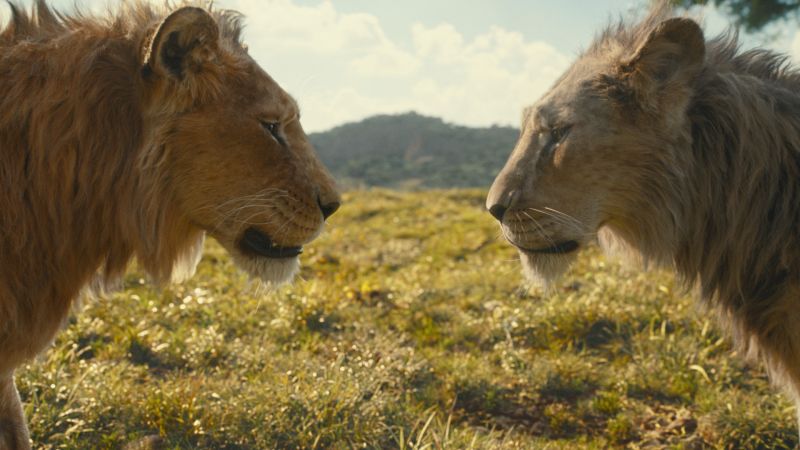Barry Jenkins on why ‘Mufasa’ contains the ‘voice of Africa’
By Joshua Korber Hoffman

CNN—Mufasa’s death in Disney’s original “The Lion King” (1994) is, for many children of the ’90s, a traumatic moment in cinema history. When Scar threw his brother off the cliff, his goodbye — “Long live the king” — dripping with sarcasm, audiences were led to believe that, like the helpless young Simba, they had seen the last of the charismatic King of the Pride Lands.But in the new film “Mufasa: The Lion King,” Mufasa’s story is told from cub to grown lion. The brotherly relationship between Mufasa and Scar — acted in the original in such brilliant counterpoint by James Earl Jones and Jeremy Irons — is explained and deepened, while the expanse of the African plains and the elegant movements of the animals are redrawn with modern CGI.In this film, a prequel to Jon Favreau’s live action remake of 2019, Mufasa (Aaron Pierre) is an orphaned cub who finds a brother in Taka (later to be known as Scar, played by Kelvin Harrison Jr.). Taka and Mufasa both want one thing — the closeness of family in a sometimes ruthless animal kingdom — and set off together on a journey to build a pride of their own.‘A great deal of responsibility’Directed by Oscar-winner Barry Jenkins (“Moonlight,” “If Beale Street Could Talk”), the latest additionto the franchise follows not only the films but the world-famous stage musical. So significant is “The Lion King”in Western culture, Jenkins told CNN, that it is, “for some people, their first or their primary connection to the continent of Africa.”"Mufasa: The Lion King" tells the story of the King of the Pride Lands from cub to grown lion.DisneyTelling a story that contains “the voice of the continent,” said Jenkins, came “with a great deal of responsibility.”In “Mufasa,”the character of Rafiki most clearly represents that voice — the wise mandrill whose mentorship guides multiple generations of lions in the Pride Lands. He plays the role of storyteller in a film that begins after the events of “The Lion King,” before traveling back in time.The young Rafiki is played by South African actor Kagiso Lediga, who sees his character as drawing wisdom from across Africa. “Rafiki is a traveler,” said Lediga, “this kind of pan-Africanist guy.”“As you’re doing it,” Lediga explained, “you go: ‘But is Rafiki Swahili? He comes from Kenya, he’s the Serengeti guy.’ But then, I’m like a Tswana guy who speaks Sepedi, who’s got a bit of Zulu and Xhosa in me.”Rafiki (left), the wise mandrill, is played by John Kani and Kagiso Lediga.DisneyJohn Kani, 81, plays the older Rafiki in the new film. “I’ve always seen Rafiki as the custodian of the culture,” he said, “A historian. Anybody in the village could say, ‘What happened to Scar? What happened to that?’ and everyone would say, ‘Go to the old man Rafiki; he will tell you.’”Storytelling across generationsRafiki is growing old in an Africa that is changing rapidly for its real-life human residents, who are increasingly moving to cities. “The challenge of Africa today,” said Kani, “is the absence of grandparents in the raising of the children in the village. Because we move into big cities, we move outside villages, we move to other countries. When the kids go home, they can’t even speak the language of the people, the indigenous languages.Grandparents have to try get an interpreter to tell them of their origin, their story, where they come from.”It is in telling those stories, and hearing them, Kani said, that one can “stand up tall as an African.”John Kani, ahead the South African premiere of "Mufasa: the Lion King" in Johannesburg, on December 12, 2024.Marco Longari AFP/Getty ImagesThe multi-lingual Rafiki is typical of Jenkins’ film, with Zulu and Swahili peppering the movie’s dialogue. It is, according to Lediga, due to Jenkins giving him “license” to speak freely and improvise. Kani, too, spoke of the recognition that Jenkins gave him “as a creative spirit.”“There’s a whole scene in this movie that we made up on the spot,” said Jenkins, “And it only could come out of John Kani telling me about his experiences on the continent. So, I really think being open to the actors driving the process in a certain way, and especially the actors from the African continent — because I do not live there, I do not know the place as well as them … opened up the movie so much.”